It appears the Buy American Act (BAA) and the Trade Agreements Act (TAA) may, under certain instances, actually reduce the federal market accessibility for US manufacturers. (Federal News Network, October 28, 2019)
In order to be considered for a small-business set-aside, end-items must be manufactured in the U.S. Or the company can qualify as a non-manufacturer (13 CFR 121.406) if:
- The company is principally engaged in the retail or wholesale of the product and normally sells the type of product being supplied
- The company takes ownership of the item with its personnel, equipment or facilities consistent with industry practice and
- The company supplies the end item of a small business manufacturer, processor or producer made in the U.S. or obtains a waiver of the requirement. (ibid)
Non-manufacturers may receive an individual waiver if the Small Business Administration (SBA) accepts the contracting officer’s determination that no small business manufacturer “reasonably can be expected to offer a product meeting the solicitation specifications.” Additionally, the SBA Administrator may provide a class waiver if she determines that no small business manufacturer “product or class of products is available to participate in the Federal procurement market.”
Of course, TAA restricts product acquisition to manufacturers in the U.S. and certain “designated countries,” (those companies that have a Free Trade Agreement with the U.S. or participate in the World Trade Organization Government Procurement Agreement (WTO GPA)). Therefore, products from non-signatory countries such as China are ineligible for award. Per FAR 25.101(a), BAA restricts the purchase of non-domestic end-products as well. Some exceptions provide more access to foreign end-products than under the TAA; for instance, BAA makes exceptions where the domestic offer is not the low offer (FAR 25.103) as well as in certain instances of public interest for non-availability in the U.S., and at an unreasonable cost. (ibid)
TAA does not apply to small business set-asides, FAR 25.401, leaving the BAA in place. The waiver of the non-manufacturer rule for a set-aside gives a somewhat illogical result. This makes the TAA inapplicable to set-asides, and the BAA applicable to set-asides where the non-manufacturer rule has been waived. This might result in the Government purchasing an item, such as a medical/surgical product, manufactured in a non-designated country that has subsidized its price to assure the product’s selection. Therefore, the intended law restricting non-domestic products actually facilitates more access to those products. This includes products of manufacturers from non-designated countries, rather than providing controlled access over non-domestic end-products. (ibid)
Ultimately, this could harm small and non-small manufacturers producing domestically. This may also open up small business set-asides to products made in China that would otherwise be ineligible for purchase if the TAA applied. A good deal more statutory guidance and analysis are warranted. (ibid)
Do you have questions about your compliance obligations under an upcoming proposal or current contract? Give us a call.

